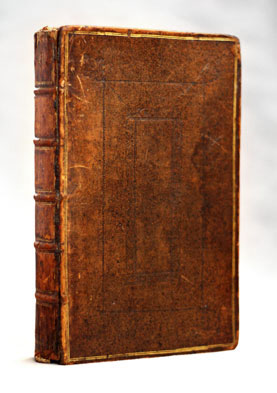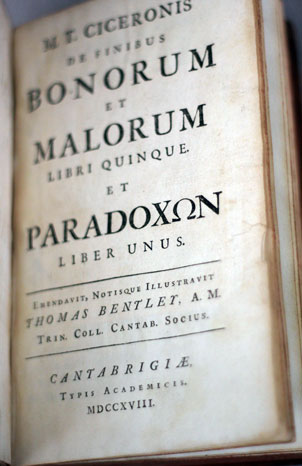Title: De finibus bonorum et malorum (complete) et Paradoxon (book one)
Author: Marcus Tullius Cicero, Thomas Bentlet (notes)
ISBN: –
Publisher: Cambridge, 1718
Condition: Hardcover, full leather. In fantastic condition for its age: front cover repaired, all contents firmly bound. No trace of damages or foxing.
This is the famous Cambridge edition: now almost impossible to find. All text is in Latin.
De finibus bonorum et malorum (On the ends of good and evil) is a philosophical work by the Roman orator, politician and philosopher Marcus Tullius Cicero. It consists of five books, in which Cicero explains the philosophical views of Epicureanism, Stoicism, and the Platonism of Antiochus of Ascalon.
The book was developed in the summer of the year 45 B.C. within about one and a half months. Together with the Tusculanae Quaestiones written shortly afterwards, De finibus is the most extensive philosophical work of Cicero. It is dedicated to Marcus Junius Brutus.
First and second book (Liber Primus and Liber Secundus)
In the first two books Cicero argues against Epicureanism. This happens in form of a fictitious discussion between two friends of Brutus on Cicero’s estate at Cumae. In the first book the interlocutors present the theory of hedonism, with which pleasure in form of the absence of pain is regarded as the highest good. In the second book Cicero criticizes this view, whereby he attacks the hedonistic definition of pleasure and argues that it cannot be equated with the highest good.
Third and fourth book (Liber Tertius and Liber Quartus)
In the next two books the Stoic school is discussed. In the third book Cicero’s interlocutor Marcus Porcius Cato presents Stoic theory, whereby he introduces in Latin the technical terms used by the Stoics. The highest and only good of the Stoics is presented as a moral good. In his counterattack in the fourth book Cicero doubts the derivation of the Stoic view as a supposed natural state as well and the exclusion of other goods by these teachings.
Fifth book (Liber Quintus)
In the last book Cicero presents in the form of a dialogue between him and several friends the theory of the Academics as taught by Antiochus of Ascalon. This sees a perfectly happy life, in which both virtue, and physical, external goods are contained in the highest good. At the end of the book, however, the logical inconsistency of this teaching is criticized, so that there is no conclusion as to which is the best school.



